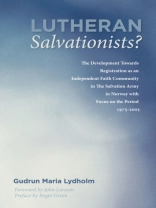The idea of a state religion is seldom connected to religious freedom and liberal, modern, and democratic states. However, such a situation existed in Norway until 2012, when the Lutheran Church was the state church of Norway. A large majority of the population belonged to the church, even though the percentage in 2013 had fallen to well over seventy-five. The relationship between the church and minority religious movements demanded adaptation and compromises from the minority churches. The Salvation Army’s enculturation and accommodation during its 128-year history in Norway illustrates such a situation. The book examines how The Salvation Army accommodated itself both doctrinally as well as practically to the situation of a dominant state church. The study reveals such a close affiliation of Salvationists to the Norwegian Church as a state institution, that it raises the question of whether a concept of civil religion was implicitly present in Salvationists’ view of the state church and their own adherence to the church. This situation also raises the question of what constitutes a real church. The book indicates the tension between Lutheran and Salvationist ecclesiology as well as the influence from the Lutheran Church.
लेखक के बारे में
Gudrun Maria Lydholm (DTh, Oslo University) is a Salvation Army officer, having served in ministry in local corps (congregations) in Denmark and England, as an editor of the Danish Salvation Army publications and in leadership positions in Russia/CIS, Finland/Estonia and Norway, Iceland, and the Faroes for more than forty-three years. She now lives in active retirement in Copenhagen, Denmark.







![का आवरण Brian Schrag & Julisa Rowe: Community Arts for God's Purposes [Chinese] 貼近神心意的社群藝術 का आवरण Brian Schrag & Julisa Rowe: Community Arts for God's Purposes [Chinese] 貼近神心意的社群藝術](https://static.worldofdigitals.com/thumb_webp/740/9781645083740.webp)




